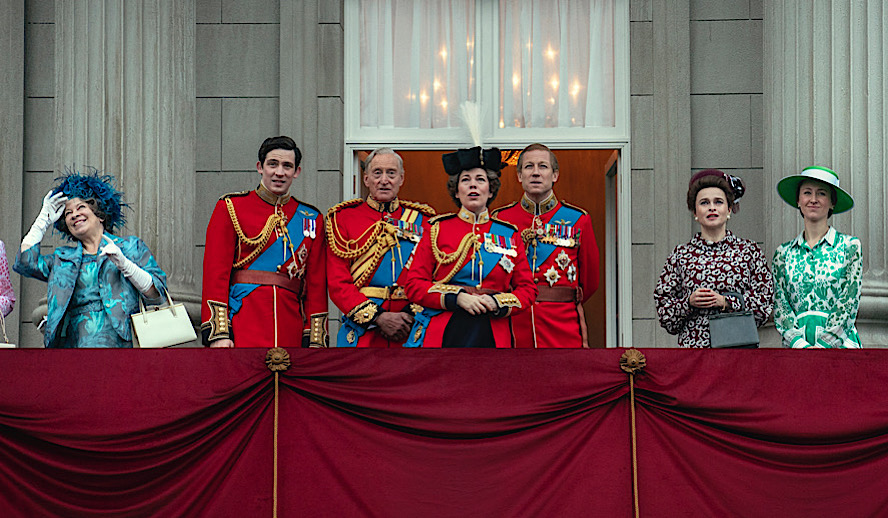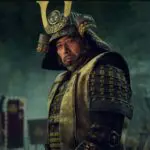Table of Contents

Photo: ‘The Crown’/Netflix. (L-R) Queen Mother (MARION BAILEY), Prince Charles (JOSH O CONNOR), Mountbatten (CHARLES DANCE), Queen Elizabeth II (OLIVIA COLMAN), Prince Philip (TOBIAS MENZIES), Princess Margaret (HELENA BONHAM CARTER), Princess Anne (ERIN DOHERTY)
Game of Thrones. Downton Abbey. Outlander. If you are fond of historical (or pseudohistorical) drama, sumptuous costumes and set design, breathtaking vistas, arch and witty dialogue delivered in a panoply of brogues and lilts, and heartwrenching romances, you have likely binge-watched at least one of these shows. The others are probably at least in your periphery; perhaps you’re saving them for the next quarantine. Rounding out its triumphant fourth season on Netflix, Peter Morgan’s The Crown has absolutely earned its place in this regalia of Anglophile entertainment. In fact, considering that the show has been utterly sublime since the outset and has only matured in its prestige, The Crown may have earned the designation of (forgive me) Queen of the TV Dramas.
Related article: Kate Middleton & Meghan Markle: Both Women Can Be Great Without One Being Torn Down, Stop Pitting The Duchesses Against Each Other
The Beginning Season of ‘The Crown’
4 years ago, Netflix premiered its most ambitious project to date: a series that chronicles the life of Queen Elizabeth II and the state of the country her family governs over decades of historic triumphs and crises. In November of 2016, The Crown boasted a bold cast to capture the early career of the Queen, with Claire Foy as the newlywed Princess Elizabeth, Matt Smith as her Prince Philip, and John Lithgow as the monumental Prime Minister Winston Churchill. Ranging from themes of political espionage to love affairs, the first season’s striking balance of historic grit and mythical storytelling garnered universal acclaim from critics and fans alike. As a result, The Crown proved to be an award season darling, amassing Emmy and Golden Globe wins for Foy and Lithgow’s outstanding lead performances as well as several awards for the Netflix team behind the cameras such as costume design, cinematography, and directing. The early seasons of The Crown were an authoritative success; however, it was the innovation that came in the latter seasons of the royal drama that would cement this series’s genius.
Ambitious storytelling is a must for this kind of series; these grand episodic epics tend to cover years’ worth of story, namechecking or alluding to countless real-life events along the way. By this measure, The Crown has most other shows beat; each season covers roughly a decade. The series declared an extraordinary shift in normative storytelling by tagging in a new cast of actors to take on the familiar set of characters as the eras of the family’s rule over the United Kingdom matured. At the conclusion of the show’s planned six-season run, it will have chronicled sixty years of Queen Elizabeth II’s royal saga. The third season of The Crown focused on the mid-1960s to late 1970s, and with the change in time came Academy Award winner Olivia Colman taking over the mantle of Queen Elizabeth II, Game of Thrones alum Tobias Menzies inhabiting the developing Prince Philip, and Helena Bonham Carter emerging as the Queen’s dutiful sister, Princess Margaret. The resolute move to evolve the cast of characters proved both wise and consequential as it continued the show’s long run of critical success, allotting Colman a Golden Globe for her triumphant performance as the Queen, as well as determining the realistic, ever-changing, and unpredictable spirit of the series for the seasons to come. Season four concludes the reign of Olivia Colman and Tobias Menzies. They will be missed, but this season is a phenomenal sendoff. The die has been cast for the final seasons to feature Imelda Staunton and Jonathan Pryce.
Subscribe to Hollywood Insider’s YouTube Channel, by clicking here.
Two Powerful Women Rock ‘The Crown’ in Reel and Real Life
The rarity of a series finding itself at the height of its greatness in its fourth season is often unheard of, but this is just another way in which The Crown continues to demolish all expectations. The intimidating success of the previous three seasons can only be described as inexhaustible, as according to statistics reported by Netflix, 73 million households have streamed The Crown since its 2016 debut, a tremendous feat placing the show at the forefront of the streaming service’s most popular original content. With tens of millions of fans desperate for the next chapter in the royal family’s saga, the creators of The Crown had two secret weapons in store for the fourth season that would secure the series’s increment ascension toward new levels of achievement. Season four of The Crown explores the journey of Queen Elizabeth and her family during the late 70s and throughout the 80s which involves the introduction of two women who left equally prominent, though thoroughly stark, marks on the history of the United Kingdom, let alone the entire world. Those two women being the uber-famous Princess Diana and the powerful Prime Minister Margaret Thatcher.
The Universally Beloved Princess Diana Stomps in and on ‘The Crown’
The tragic story of Diana has burrowed its way into the hearts and minds of all who are familiar with the past 30 years of world history, as her unprecedented compassion and grace as a leader made her a timeless figure in the world of politics as well as popular culture altogether. Emma Corrin is a relatively fresh face to the entertainment industry, but it must be said that the young star knows how to make an entrance. For all its abundant talent on display, the season’s most poignant narrative thrust belongs to her. Introduced in the costume of a ‘mad tree’ for a school production of A Midsummer Night’s Dream, Diana is an enigmatic ingenue who instantly captures the attention of Prince Charles (Josh O’Connor). On top of looking like a mirror image of the adored princess, Corrin utterly embodies the bubbly and true-to-herself spirit of the icon. Knowing that the addition of Princess Diana’s story will draw in hoards of viewers, The Crown completely delivers on conveying a thoughtful and substantial representation of her character.
Related article: The Power of Positivity: Ikorodu Bois + Chris Hemsworth + Russo Brothers + Sam Hargrave
Limited Time Offer – FREE Subscription to Hollywood Insider – Click here to read more on Hollywood Insider’s vision, values and mission statement here – Media has the responsibility to better our world – Hollywood Insider fully focuses on substance and meaningful entertainment, against gossip and scandal, by combining entertainment, education, and philanthropy.
Initially emphasizing the charming and disarming public charisma of the young princess, The Crown understands the features that made Diana so mesmerizing and Emma Corrin dutifully replicates this essence, satisfying all audiences eager to remember how it felt to behold such a brilliant public figure. Diana is soon swept away by the fairytale of it all, rushed through a whirlwind engagement that soon finds her regarded as more captive than captivating. The new Princess of Wales, an impressionable young woman over a decade her husband’s junior, roller skates alone through Buckingham Palace with Duran Duran’s ‘Girls on Film’ on her walkman while being willfully neglected by every member of her newfound family. She has the potential to refresh the rarified air of the royals, but they are each so suffocated by their own tortured circumstances that they are unable to withstand her purity.
What makes The Crown’s depiction of Princess Diana so remarkable, however, is the deeper layers of the character that they analyze throughout the drama. As Diana’s story rapidly evolves from teen crush to royal bride, The Crown examines the complicated experience the national treasure underwent. The intense feeling of isolation when ignored by her fiance, the anger that overcame her when she felt underutilized by the family she married into, and, perhaps most saliently, the battle the princess fought with her eating disorder. The third episode of the fourth season thoughtfully and carefully presents Princess Diana’s ailment of bulimia as she attempts to survive the stress of the nation calling on her to fit into the unattainable mold of the princess. Although this illness marks yet another grievous chapter of Princess Diana’s life, it is essential that The Crown include the reality of the princess’s fight with her eating disorder in a compassionate manner it does as it both honors the authentic battle Diana fought and legitimizes the strife millions of people face when suffering from a potentially fatal illness that is too often dismissed in and out of media. The Crown honors the altruistic legacy of Princess Diana by including this hardship in her story as it holds the capability to benefit millions of viewers that may be going through the same agonizing battle.
Related article: Hollywood Insider’s CEO Pritan Ambroase: “The Importance of Venice Film Festival as the Protector of Cinema”
Related article: The Masters of Cinema Archives: Hollywood Insider Pays Tribute to ‘La Vie En Rose’, Exclusive Interview with Director Olivier Dahan
The Iron Lady – Prime Minister Margaret Thatcher – Leader of the United Kingdom
Queen Elizabeth ostensibly corrects her lackluster motherhood to her children by being the mother of the nation, which puts her at loggerheads with Margaret Thatcher. The question of whether tenderness or tough love are better approaches to inspire greatness becomes central to policy debate during Thatcher’s time as prime minister, but this is also a question right at the heart of The Crown. There is no doubt that the royals often become disciplined, motivated individuals with developed senses of philanthropy and service in adulthood. Whether this because of or in spite of their demanding and remote rearing is not entirely clear. Thatcher, played by Gillian Anderson in another of the show’s highlights, has her own parental issues, and these play out on a national scale. Prime Minister Margaret Thatcher, on top of being the first woman elected Prime Minister of the United Kingdom, Thatcher’s name is etched in history for her unwavering and sweeping conservative policy.
The character of Prime Minister Thatcher has donned screens before, notably when Hollywood legend Meryl Streep portrayed the divisive politician in the 2011 film, The Iron Lady. Streep’s Academy Award-winning performance of Thatcher finds stiff competition in The Crown’s adaptation of the Prime Minister’s story, which features X-Files and Sex Education phenomenon Anderson. Anderson is stunning as she completely transforms into the Thatcher, from the details of her slow and calculated physicalities to her hauntingly rugged voice. In the context of The Crown, Thatcher’s relationship with both Queen Elizabeth and the people of the United Kingdom is called into question. Anderson’s performance expertly highlights the unruly and resilient attributes of the Prime Minister, a woman questioned at every turn, especially by the men of her own party. As her storyline unfolds, Thatcher’s contrast from Queen Elizabeth underlines the different ways in which women leaders are forced to legitimize their power, as well as how they yield it.
Related article: FACT-CHECKED SERIES: Prince Harry and 32 Facts on the Duke of Sussex
Historical Fiction at Its Finest
The additions of Margaret Thatcher and Princess Diana are tremendous, but far from the only reasons to embark on the latest chapter of The Crown. What is truly exceptional about the Netflix series is its flawless execution of transforming decades of dense history into digestible and enthralling entertainment. The aptitude the creative minds behind The Crown have for forming dynamic and poetic character arcs for real humans with extraordinarily confounding public lives is profound. For example, the relationship between Prince Charles, his lover Camilla Bowles, and Princess Diana is expressed in the form of an inarguably gratifying and juicy love triangle similar to that of a popular soap opera. The Crown’s ability to share a story that is both educational in its historic merit as well as captivating in its emotional heft is truly unique and solidifies the series as a must-watch.
Prince Charles – The Reluctant Prince
This is a family completely quagmired in the karmic tunnel of imperial decay. Previous seasons chronicled the tribulations of Queen Elizabeth’s younger sister Princess Margaret, whose love life was so calculatingly micromanaged by the state that it nearly broke her completely. She is played here, sardonic in defeat, by a terrifically louche Helena Bonham Carter. The mistake is repeated yet again with Prince Charles, whose devotion to the married-with-children Camilla Parker Bowles is regarded as untenable for the heir apparent. It would be quite simple for The Crown to demonize Charles, who comes to dismiss the effervescent Diana as something between a broodmare and an albatross around his neck. Instead, the show gives a nuanced impression of the Prince of Wales’ own misery.
Related article: ‘God’s Own Country’ is a Must Watch for Fans of ‘Call Me By Your Name’
The situation between Charles and Diana is simply a microcosm for the status of the royal family as an entity in the 20th century. There is always an attempt to marry tradition to modernity, but both sides resist until a shaky detente is reached in which neither party is satisfied. Finding herself ignored at home, Diana increasingly seeks acknowledgment from the general public, where she becomes a sensation. This of course only serves to infuriate the perpetually overlooked Charles. Time and time again, resentment becomes the lingua franca of a family otherwise unable to effectively communicate. So much of the pain swirling around the royal family seems to come from generations upon generations of disappointments, excruciating pressure, and parental neglect in the name of sovereign duty. When it comes to the Queen’s capacity for devotion, it seems she has too much and never enough.
Power in a Multitude of Perspectives
Perhaps the most fascinating and refreshing aspect of The Crown is the scope of its perspective. Whereas Downton Abbey takes place mostly inside its own fishbowl and Game of Thrones is globetrottingly cosmopolitan, The Crown takes a different tack. It constantly recontextualizes its own narrative with new points of view, often accomplishing this by introducing one-off protagonists whose lives are forever altered by the inescapable gravity of the royal family. In one episode, we see the perspective of an unemployed man cut to the bone by the stringent economic policies of Thatcherism. Increasingly isolated and desperate, he eventually concocts a plan to break into the palace to tell the queen of his dissatisfaction.
In another, we meet a moonlighting novelist who has the daytime designation of palace press secretary. Despite his invaluable assistance in finding the right vocabulary to translate between the queen and the prime minister, he is eventually treated as convenient yet forgettable. By vaulting between the perspectives of diplomats, civil servants, and average private citizens, The Crown gives us a glimpse of the immensity of the role the monarchy plays in the British psyche. It is something that from the outside seems so ornate and resplendent, and yet within is vastly hollow.
Related article: Oprah Winfrey: 32 Facts on the Queen of Hollywood and Most Inspiring Media Mogul
Related article: Powerful Technique for Success, Personal Development and Leadership
What is clear is that these people, like the country that they rule, is in crisis. From the Falklands War to the British conflict with the IRA, The Crown’s fourth season intimately recounts many of Britain’s most challenging moments as a nation in the late 20th century. Despite the anxiety both in the palace and amongst the general population, however, The Crown is not an anxiety-inducing program. It is a moving and thought-provoking reflection on society told with humanity and depth. It is at times tragic, at times comic, but always beautifully filmed and executed. It is indubitably royal appointment television.
Additionally, The Crown masters several creative storytelling devices in this season like dramatic irony and symbolism that allow the audience to have a wholly interactive and intellectually deep relationship with the series. As The Crown recounts several historic events that the entire world is familiar with, such as wars and national tragedies, examples of dramatic irony often come in the form of foreshadowing. The heartbreaking fate of Princess Diana is not included in the fourth season as it caps off around the year 1990; however, the foreshadowing is evident as the paparazzi’s intrusive relationship with Diana is introduced almost simultaneously with Diana’s own premiere in the show. In this instance, the audience knows much more than the characters of The Crown, infusing additional drama into the viewing experience. This is all to show just how much effort is put into every detail of all scenes within the historical drama. Whether it’s a lesson in history, the character study of a beloved icon, or innovative storytelling, the fourth season of The Crown is a potent spectacle that is so satisfying it can leave fans with only one question, “How can next season top this?” For those that know their history, the unlikelihood of The Crown letting viewers down any time soon is all too apparent.
The Crown’s 4th Season is now streaming on Netflix. Seasons 1-3 can be streamed there as well.
By Trent Kinnucan and Christopher Davis
An excerpt from the love letter: Hollywood Insider’s CEO/editor-in-chief Pritan Ambroase affirms, “Hollywood Insider fully supports the much-needed Black Lives Matter movement. We are actively, physically and digitally a part of this global movement. We will continue reporting on this major issue of police brutality and legal murders of Black people to hold the system accountable. We will continue reporting on this major issue with kindness and respect to all Black people, as each and every one of them are seen and heard. Just a reminder, that the Black Lives Matter movement is about more than just police brutality and extends into banking, housing, education, medical, infrastructure, etc. We have the space and time for all your stories. We believe in peaceful/non-violent protests and I would like to request the rest of media to focus on 95% of the protests that are peaceful and working effectively with positive changes happening daily. Media has a responsibility to better the world and Hollywood Insider will continue to do so.”
Vote with a conscience – Register to Vote – Your vote saves lives and ends systemic racism
Ways to support Black Lives Matter Movement to end systemic racism
More Interesting Stories From Hollywood Insider
– Want GUARANTEED SUCCESS? Remove these ten words from your vocabulary| Transform your life INSTANTLY
– Compilation: All James Bond 007 Opening Sequences From 1962 Sean Connery to Daniel Craig
– Do you know the hidden messages in ‘Call Me By Your Name’? Find out behind the scenes facts in the full commentary and In-depth analysis of the cinematic masterpiece
– A Tribute To The Academy Awards: All Best Actor/Actress Speeches From The Beginning Of Oscars 1929-2019 | From Rami Malek, Leonardo DiCaprio To Denzel Washington, Halle Berry & Beyond | From Olivia Colman, Meryl Streep To Bette Davis & Beyond
– In the 32nd Year Of His Career, Keanu Reeves’ Face Continues To Reign After Launching Movies Earning Over $4.3 Billion In Total – “John Wick”, “Toy Story 4”, “Matrix”, And Many More
The Crown, The Crown, The Crown, The Crown, The Crown, The Crown, The Crown, The Crown, The Crown, The Crown, The Crown, The Crown, The Crown, The Crown, The Crown, The Crown, The Crown, The Crown, The Crown, The Crown, The Crown, The Crown, The Crown, The Crown, The Crown, The Crown, The Crown, The Crown










